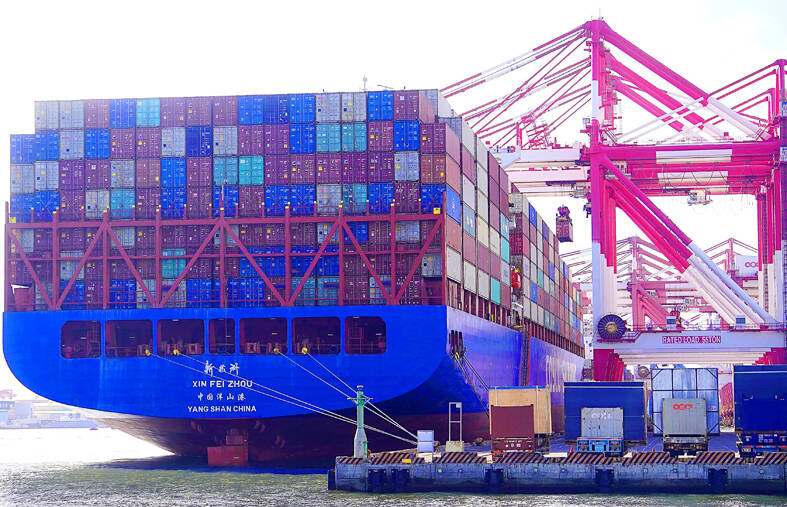Taiwan’s official manufacturing purchasing managers’ index (PMI) last month shed 1.5 points to 52.2, staying in expansion mode for the third straight month, although uncertainty linked to the US presidential race caused a stir, the Chung-Hua Institution for Economic Research (CIER, 中華經濟研究院) said yesterday.
The PMI published yesterday by S&P Global also showed that Taiwan’s factory activity continued to expand last month, falling to 52.9 from 53.2 in June.
PMI data seek to measure the health of the manufacturing industry with values of 50 and higher suggesting expansion and points below the neutral threshold indicating contraction.

Photo: CNA.
“Things remain positive overall, but recent remarks by US presidential candidates revived concern over tariff hikes,” CIER president Lien Hsien-ming (連賢明) said.
Taiwanese firms turned from feeling upbeat to cautious after former US president and Republican Party presidential nominee Donald Trump said in an interview last month that Taiwan “took all of [the US’] chip business” and should pay the US for defense. Trump has also pledged to raise tariffs on imports to address what he calls unfair trade practices.
The subindex on new business orders weakened 5.3 points to 53.9, while the industrial production subindex lost 2.5 points to also reach 53.9, the Taipei-based think tank said, citing a monthly survey.
Tech firms generally saw their business pick up, but firms involved in the supply of transportation tools, basic raw materials and machinery equipment reported business decreases, the institute said.
Firms conservatively increased their payroll and sought mostly to meet demand by enhancing their operating efficiency, it said, explaining why the measure on employment added a tiny 0.7 points to 51.9.
The subindex on inventory lost 0.4 points to 49, while clients’ inventory gained 1.5 points to 44.6, consistent with a cautious approach, the survey showed.
The gauge on raw material prices dropped 3.2 points to 57.3, remaining elevated and a concern for margin pressure, the institute said.
The six-month outlook declined 4.2 points to 55, as the US presidential election affected corporate confidence while the high sales season draws near, it said.
The business reading on non-manufacturing sectors fell 1.3 points to 57.3, expanding for 21 consecutive months, with all service-oriented sectors faring well, the institute said in a separate survey.
Private consumption held strong even though the TAIEX pulled back and the central bank tightened credit controls, Lien said.

SEMICONDUCTORS: The German laser and plasma generator company will expand its local services as its specialized offerings support Taiwan’s semiconductor industries Trumpf SE + Co KG, a global leader in supplying laser technology and plasma generators used in chip production, is expanding its investments in Taiwan in an effort to deeply integrate into the global semiconductor supply chain in the pursuit of growth. The company, headquartered in Ditzingen, Germany, has invested significantly in a newly inaugurated regional technical center for plasma generators in Taoyuan, its latest expansion in Taiwan after being engaged in various industries for more than 25 years. The center, the first of its kind Trumpf built outside Germany, aims to serve customers from Taiwan, Japan, Southeast Asia and South Korea,

Gasoline and diesel prices at domestic fuel stations are to fall NT$0.2 per liter this week, down for a second consecutive week, CPC Corp, Taiwan (台灣中油) and Formosa Petrochemical Corp (台塑石化) announced yesterday. Effective today, gasoline prices at CPC and Formosa stations are to drop to NT$26.4, NT$27.9 and NT$29.9 per liter for 92, 95 and 98-octane unleaded gasoline respectively, the companies said in separate statements. The price of premium diesel is to fall to NT$24.8 per liter at CPC stations and NT$24.6 at Formosa pumps, they said. The price adjustments came even as international crude oil prices rose last week, as traders

Taiwan Semiconductor Manufacturing Co (TSMC, 台積電), which supplies advanced chips to Nvidia Corp and Apple Inc, yesterday reported NT$1.046 trillion (US$33.1 billion) in revenue for last quarter, driven by constantly strong demand for artificial intelligence (AI) chips, falling in the upper end of its forecast. Based on TSMC’s financial guidance, revenue would expand about 22 percent sequentially to the range from US$32.2 billion to US$33.4 billion during the final quarter of 2024, it told investors in October last year. Last year in total, revenue jumped 31.61 percent to NT$3.81 trillion, compared with NT$2.89 trillion generated in the year before, according to

PRECEDENTED TIMES: In news that surely does not shock, AI and tech exports drove a banner for exports last year as Taiwan’s economic growth experienced a flood tide Taiwan’s exports delivered a blockbuster finish to last year with last month’s shipments rising at the second-highest pace on record as demand for artificial intelligence (AI) hardware and advanced computing remained strong, the Ministry of Finance said yesterday. Exports surged 43.4 percent from a year earlier to US$62.48 billion last month, extending growth to 26 consecutive months. Imports climbed 14.9 percent to US$43.04 billion, the second-highest monthly level historically, resulting in a trade surplus of US$19.43 billion — more than double that of the year before. Department of Statistics Director-General Beatrice Tsai (蔡美娜) described the performance as “surprisingly outstanding,” forecasting export growth